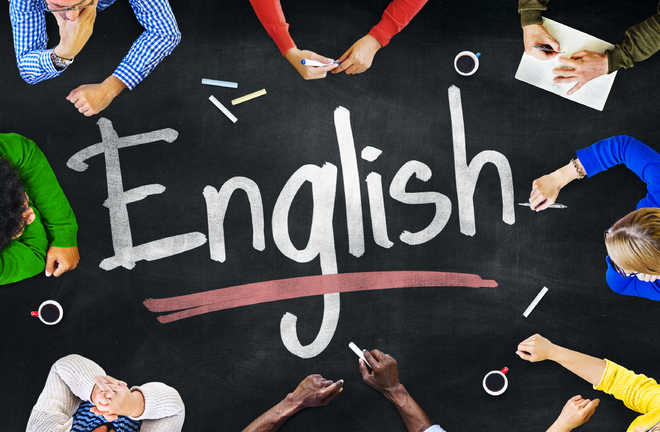
Pervin Malhotra
email your queries to [email protected]
Q.I studied in a government school and after that did my BCom through correspondence. I am now doing the Company Secretary course. But I am not very confident about speaking in English. Even where I’m working as intern, I feel very embarrassed because of this. Please suggest how to improve my English. — Sunil Kumar
A. Like it or not, English is the most widely spoken language in the world, besides being the lingua franca or global link language of education, technology and trade in most parts of the world. And with the world’s largest share of English speaking people, India is fast emerging as the centre of gravity.
Moreover, English has a unique bearing in aspirational India where it’s considered a passport to upward social and financial mobility.
Presently, and more so in the days to come, those who can’t speak and write good English will find it increasingly tough to survive in the modern Information Age.
But it’s not as tough as it seems. The best way to improve your verbal skills is through self-learning. And this is possible by consciously listening to English programmes on radio, TV and internet while paying special attention to correct pronunciation and intonation. Make it a practice to watch Ted talks and keenly observe the good speakers. Practice reading aloud from the newspaper or magazine (in privacy of course!). This simple exercise will also hone your GK skills. Browse these five pages: front page, business, international, edit and sports. Make bullet points on the edge capturing the gist of the articles. Record and review your process.
But don’t stop there. Grab every opportunity to converse in English. The more, the better! Ask a well-meaning friend to help you out and correct you wherever necessary. Don’t be afraid of making mistakes. English is not our mother tongue. Few of us can claim to be hundred percent fluent. However, practice makes perfect.
Once you’ve overcome the initial hesitation, you’ll be pleasantly surprised how quickly your vocabulary and conversational skills improve. Just try these simple steps and you’ll be pleasantly surprised.
There are plenty of mobile apps and audio tutorials that you can use.
Try http://learnenglish.britishcouncil.org/en
This free website helps you strengthen your English language skills through fun games and interesting exercises. Similarly, you can download the free Voice of America’s VOA Learning English app to practice listening everyday with the help of stories, lessons and news reports in the form of audios and videos.
Hydrological engineering’s scope
Q.I am pursuing civil engineering. Could you please tell me something about hydrological engineering and what it takes to pursue a career in this field? — Harpal Issar
A. As you may have briefly gathered from your civil engineering curriculum, this branch of engineering focuses on studying the occurrence, movement, quality and properties of water that’s collected from the earth. Hydrologists apply scientific theories to resolve water-related issues by calculating and auditing water resource systems and analysing the quality of water and where it can be used best.
Besides a keen interest in science, a career in hydrology demands keen observation skills, long hours of work and high patience levels. Astute judgement and decision-making skills also come handy while analysing and testing water bodies.
A Master’s in Hydrology will enable you to work with the Central Water Commission, the National Institute of Hydrology, municipal water divisions, state water resources and irrigation departments, and other private hydropower companies.
Besides IIT Roorkee’s Department of Hydrology which offer an MTech in Hydrology, a related course, MTech in Water Resources Engineering which is offered at: IIT – Delhi, Sardar Vallabhbhai NIT, NIT – Rourkela, Malaviya National Institute of Technology (MNIT), Jaipur etc
Water Resources Engineering is a specialty of civil engineering that focuses on water supply, irrigation and waste disposal. It also addresses methods for controlling water to avoid water-related damage and catastrophes. And besides these, 40+ engineering colleges offer MSc in Hydrology in the country.
Students of Agricultural Technology who wish to apply engineering solutions to emerging global environmental problems in water resources can specialise in irrigation, drainage, groundwater quality, water table management, animal waste management, sustainable agricultural production systems and modelling of hydrologic systems.
Mechanics of research
Q.I am pursuing MSc in physics. Can you help me choose between engineering research and scientific research, as I’m eligible for pursuing a PhD in both fields? — Sarang Gulati
A. While a scientist asks “why” and proceeds to research the answers, an engineer explores “how” to solve a problem and implement that solution.
In other words, scientists investigate phenomena, while engineers find solutions or improve upon existing solutions. However, there’s often an overlap between science and engineering.
Often scientists don an engineer’s cap to work on the practical application of their discoveries;
Conversely, while developing technology, engineers may find themselves exploring new phenomena, thus assuming the mantle of a, scientist.
For example: using numerical approximations to the Navier-Stokes equations to solve aerodynamic flow over an aircraft, or applying Miner's Rule to calculate the fatigue damage to an engineering structure.
While engineering research might overlap with science, it’s always pursued with one or more applications in mind.
The Joint Entrance Screening Test (JEST) is conducted for admission to PhD / Integrated Ph.D Programme in Physics or Theoretical Computer Science or Neuroscience or Computational Biology. JEST scores are valid for one year.
Eligibility for Integrated PhD: BSc. in physics/maths
Eligibility for regular PhD: MSc in physics/applied-physics; BTech/BE/ME/MTech/4-year BS/MCA can also opt for integrated and regular PhD programmes in some institutes.
Final year students pursuing these courses can also take the JEST which is usually held in February.
The application deadline is typically mid-December of the previous year.
Details: www.jest.org.in



























